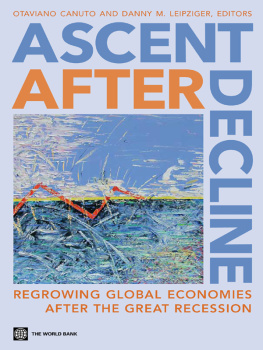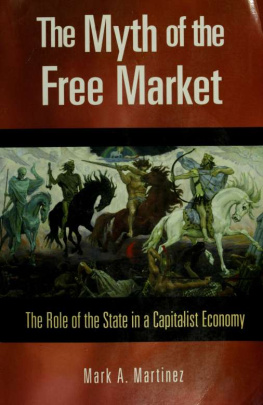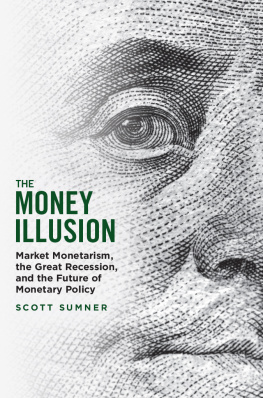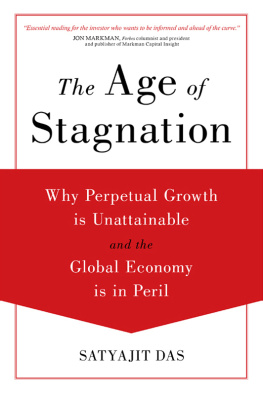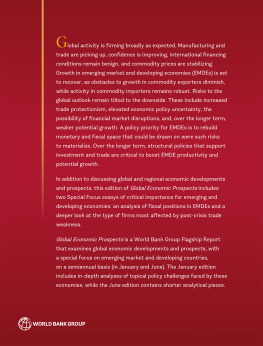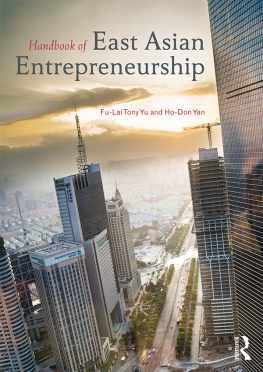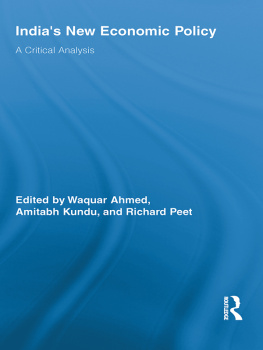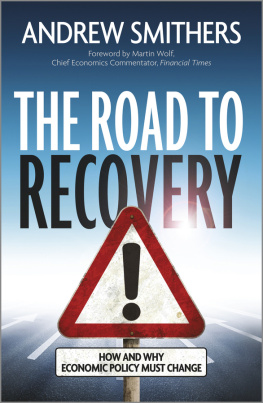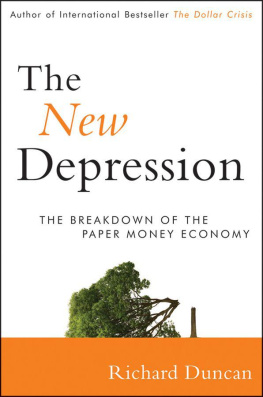ASCENT
AFTER DECLINE
Regrowing Global Economies
after the Great Recession
OTAVIANO CANUTO
AND
DANNY M. LEIPZIGER

2012 The International Bank for Reconstruction and Development / International Development Association or The World Bank
1818 H Street NW
Washington DC 20433
Telephone: 202-473-1000
Internet: www.worldbank.org
All rights reserved
1 2 3 4 15 14 13 12
This volume is a product of the staff of The World Bank. The findings, interpretations, and conclusions expressed in this volume do not necessarily reflect the views of The World Bank, its Board of Directors, or the governments they represent.
The World Bank does not guarantee the accuracy of the data included in this work. The boundaries, colors, denominations, and other information shown on any map in this work do not imply any judgment on the part of The World Bank concerning the legal status of any territory or the endorsement or acceptance of such boundaries.
Rights and Permissions
The material in this publication is subject to copyright. The World Bank encourages dissemination of its knowledge; this work may be reproduced, in whole or in part, for noncommercial purposes as long as full attribution to the work is given.
For permission to photocopy or reprint any part of this work, please send a request with complete information to the Copyright Clearance Center Inc., 222 Rosewood Drive, Danvers, MA 01923, USA; telephone: 978-750-8400; fax: 978-750-4470; Internet: www.copyright.com.
All other queries on rights and licenses, including subsidiary rights, should be addressed to the Office of the Publisher, The World Bank, 1818 H Street NW, Washington, DC 20433, USA; fax: 202-522-2422; e-mail: .
ISBN: 978-0-8213-8942-3
eISBN: 978-0-8213-8943-0
DOI: 10.1596/978-0-8213-8942-3
Library of Congress Cataloging-in-Publication Data
Ascent after decline: regrowing global economies after the great recession / edited by Otaviano Canuto and Danny Leipziger.
p. cm.
Includes bibliographical references and index.
ISBN 978-0-8213-8942-3ISBN 978-0-8213-8943-0 (electronic)
1. Economic policy. 2. Economic development. 3. Recessions. 4. Global Financial Crisis, 20082009. I. Canuto, Otaviano. II. Leipziger, Danny M. III. World Bank.
HD87.A754 2011
338.9dc23
2011040045
Cover illustration: Michael S. Geller, An Idea of Order, 2010, oil on canvas, 36 36
Cover design: Drew Fasick
Photo credit: David Scavone
About the Editors and Contributors
Editors
Otaviano Canuto is vice president and head of the World Banks Poverty Reduction and Economic Management (PREM) Network, a division of more than 700 economists and other professionals working on economic policy, poverty reduction, and analytic work for the Banks client countries.
Previously, Dr. Canuto served as the vice president for countries at the Inter-American Development Bank. He was executive director of the Board of the World Bank in 200407. He also served in the Brazilian Ministry of Finance as secretary for international affairs and has been a professor of economics at the University of So Paulo and University of Campinas (UNICAMP) in Brazil, from which he holds a Ph.D. in economics.
Danny M. Leipziger is professor of international business at George Washington Universitys School of Business. Previously (200409), he served as vice president and head of the Poverty Reduction and Economic Management (PREM) Network, as well as in other managerial positions in the World Bank. He currently manages The Growth Dialogue.
Dr. Leipziger also was vice chair of the Commission on Growth and Development, chaired by Nobel Laureate Michael Spence, which produced the Growth Report in 2008. Dr. Leipziger, who holds a Ph.D. in economics from Brown University, has authored books on the Republic of Korea, Chile, banking crises, globalization, and the middle class and has published widely in development economics.
Contributors
Philippe Aghion is Robert C. Waggoner Professor of Economics at Harvard University and an invited professor at the Institute of International Economic Studies in Stockholm.
Tito Boeri is a professor of economics at Bocconi University, Milan, and acts as scientific director of the Fondazione Rodolfo Debenedetti.
Julia Cag is an economist at Harvard University and the Paris School of Economics, where she is a doctoral candidate.
Menzie Chinn is a professor of public affairs and economics at the Robert M. LaFollette School of Public Affairs, University of Wisconsin, Madison.
Carlo Cottarelli is director of the Fiscal Affairs Department of the International Monetary Fund, Washington, DC.
Barry Eichengreen is Charles C. Pardee and Helen N. Pardee Professor of Economics and Political Science at the University of California, Berkeley.
Antonio Estache is a professor of economics at the Universit Libre de Bruxelles, Brussels.
Pietro Garibaldi is a professor of economics at the University of Turin, Italy; director and fellow of the Collegio Carlo Alberto; and head of labor studies at the Fondazione Rodolfo Debenedetti.
Paolo Guerrieri is a professor of international economics at the University of Rome La Sapienza; visiting professor of international economics and business at the College of Europe, Bruges, Belgium; and vice president of the Institute for Foreign Affairs, Rome.
Hiro Ito is associate professor of economics at Portland State University, Portland, Oregon.
Michael Keen is assistant director in the Fiscal Affairs Department of the International Monetary Fund, Washington, D.C.
Catherine L. Mann is Barbara and Richard M. Rosenberg Professor of Global Finance at the International Business School, Brandeis University, Waltham, Massachusetts.
Pier Carlo Padoan is deputy secretary-general and chief economist of the Organisation for Economic Co-operation and Development, Paris.
Brian Pinto is senior adviser in the Poverty Reduction and Economic Management Network of the World Bank Group, Washington, D.C.
Preface
The state of the global economy as of 2012 is much more troubled than most pundits had predicted. The recovery from the Great Recession has lost steam, and we have moved into more uncertain territory. There is increasing talk of a possible double-dip, financial volatility continues, and policy makers around the world are scrambling to restore stability and confidence.
In the industrialized world, the Euro Area is struggling to save its common currency, strengthen its banks, and avert an even larger debt crisis. Across the Atlantic, the United States, after an over-extended use of unconventional monetary policies, continues to face damaged household balance sheets, depressed consumption, and persistent unemployment. Japan continues its battle for economic rebirth. Against this backdrop, the role that developing countries had played in 201011, as growth engines for the global economy, may no longer be adequate as an antidote for a sluggish industrialized world. In sum, the ascent after decline, foreseen earlier in 2011, has been delayed.

